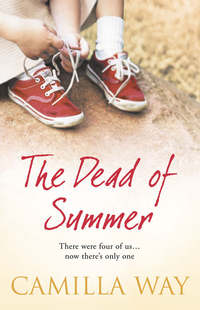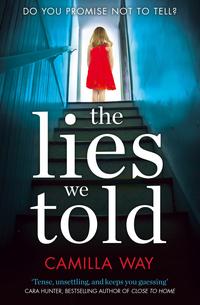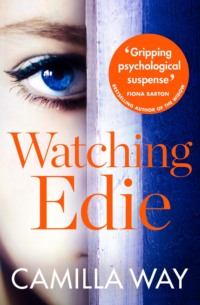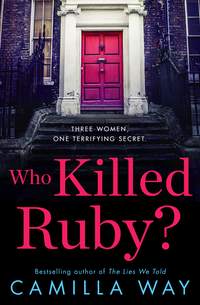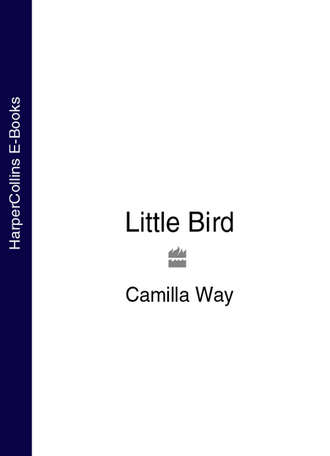
Полная версия
Little Bird
The staff at the hospital call her ‘Little Bird.’
The police investigation continues. If the child is indeed Elodie Brun, the question of where she has been held for the past ten years – and by whom – remains as yet unanswered.
The Sun
14 September 1995
Kidnap girl ‘like wild animal’
As more SICKENING details of the Elodie Brun case emerge, The Sun has learnt that Brun, 12, can only communicate in GRUNTS AND WHISTLES. After 10 years in captivity she is more wild animal than human, experts say. Evil Mathias Bresson, 42, swiped the TRAGIC TOT in 1985 and kept her prisoner in his secret woodland lair. FULL STORY ON PGS 4,5,6,7
Pictured: Deserted foresters’ shack where depraved Bresson trapped Brun for decade.
Science Tomorrow magazine
October 1995
‘Little Bird’ takes flight amid storm of controversy
The extraordinary case of Elodie Brun, the child found in a Normandy forest last month, has taken a new twist that looks set to reignite one of the most fiercely debated issues in cognitive science – how we learn to speak.
The twelve-year-old, nicknamed ‘Little Bird’ due to her astounding ability to mimic birdsong, was abducted in 1985 by Mathias Bresson. A mute since birth, Bresson took the child to a remote hideaway in the heart of the 20,000-hectare Forest de Breteuil, where the two lived for ten years until Bresson’s suicide last month.
Since it emerged that the girl has no knowledge of language, she has been attracting attention from scientists and linguists worldwide. Until now, our knowledge of how the brain acquires language has stemmed largely from theoretical arguments. Experts from Noam Chomsky to Steven Pinker have long debated the extent to which it is innate or learnt and how far is it affected by environment, brain lateralization or other cognitive factors.
No definitive answer has yet been reached because cases of ‘feral’ or ‘isolated’ children – children who have grown up without language – are extremely rare. But, for Elodie Brun, at least, a glimmer of hope has arrived in the shape of Doctor Ingrid Klein, head of cognitive science at New York University. Klein, an acclaimed expert in psycholinguistics and author of three seminal books on the subject, has been granted permission to take Elodie back to her home in Long Island, New York, in what could be one of the most important studies in this field in recent times.
In an exclusive interview, Doctor Klein told Science Tomorrow, ‘Speech is fundamental to what makes us human and I believe I will be successful in teaching Elodie to speak as well as you or I. Although she has led an extraordinary life, she is a happy, healthy and bright child with no evidence of having suffered any physical or emotional damage. My work with Elodie with the help of US government funding and with adequate scientific monitoring will, I hope, prove that not only is it possible to rehabilitate such a child but that she will be able eventually to live a normal life and integrate fully with society.’
The decision to move Elodie so far from her homeland and family has been met with controversy in France, however. But as Elodie’s mother is now unable to care for the child herself she has reportedly given the plan her full approval.
‘This is not just a scientific experiment,’ says Klein. ‘I have Elodie’s mother’s support and I am a mother myself. I believe that the best place for Elodie is in a nurturing environment where she can be helped by experts at the top of their field. That place is with me and my team in the US.’
The notion of the ‘wild child’ has captured the public imagination since the legend of Romulus and Remus. The idea of the uncivilised being taught to function normally in society is the stuff of both myth and romance. However, it’s a sad fact that such cases rarely end well. If an isolated, confined or feral child has not learnt to speak during the so-called ‘Critical Period’ outlined by Lenneberg and supported by most neurologists (see box, left) they will never learn to do so. Once rescued, nearly all such children fail to be successfully integrated into society and remain forever institutionalised.
If Klein is successful her findings will not only mean a happy ending for ‘the bird child of Normandy’, but also significantly increase our understanding of how the human brain acquires language, in what could be one of the most important experiments in cognitive science for some time.
eight
Deptford, south-east London, 22 September 2003
When Frank woke with Kate in his bed he watched her sleep for a while and willed the moment to last a little longer. Sunlight shone through dirty windows throwing the shadow of a dead geranium across the sleeping girl’s cheek. He dreaded her waking up – the inevitable moment when she opened her eyes and realised where she was and made embarrassed excuses about having to leave, how she never does this sort of thing, how she’s actually seeing someone else and then the hurried lies that she’ll phone him. The bullshit he usually gave, he realized, and wondered when it was that he’d last cared about a girl.
A crow swooped past the window, cawing noisily. Kate woke with a start, her eyes fixed at once on his. After a second or two she smiled and cupping Frank’s face, drew him towards her and kissed him. Relief flooded his veins.
‘Tell me,’ he asked later, when they were contemplating each other across the tangled sheets. ‘Where are you from? You’re not from London, are you? Are you American? What were you …’
She touched his lips to quieten him. ‘Later,’ she said. ‘Another day.’ And then she said, ‘I have to go.’
‘When can I see you again?’
‘Soon.’
‘Tomorrow?’
It was gone five by the time he walked the twenty-minute journey to his mother’s flat. A late-September day when the first cool tendrils of autumn begin to unfurl and creep through the last watery sunlit warmth of the year. The sky was pale and damp, nicotine stained. Kids yelled to each other in the remaining hours of the weekend, lone cars approached then growled on past, cats blinked at him from windowsills. And it felt like his blood sang. Like every smell and sight and sound was new and improved and unbeatable quality and he had never felt so real and certain before, never felt so sure of himself and his place in the world and it was all because of her.
At Chrysanthemum House Frank whistled as he sprang up the eight flights of stairs to his mother’s floor. Outside her door he paused on the narrow landing and looked out at the familiar view. Beyond the estate he could see southeast London spread out before him. New Cross, Lewisham, Deptford, Greenwich: a vast grey sea turning and tugging in the twilight, while in the distance the towers of Canary Wharf gazed down upon it all, unmoved.
Directly opposite, Gladioli House and Hyacinth squared up to each other in the failing light. From one lone window a white and red flag of St George fluttered resentfully in the breeze. In the scrubland below a few skunk-dazed kids lounged upon a bench, mumbling to each other from beneath their hoods while a girl dragged her screaming pushchair past a sign that said No Ball Games. Frank turned to unlock the door with his spare key. Next to it, uneven letters scratched into the brickwork said, ‘Eugene Rules’, and ‘Jimmy is a bender’. He grinned as he let himself in.
‘Mum?’ The familiar bleachy heat of his mother’s flat hit him full in the throat. He found her on the sofa, boredom and loneliness draped around her shoulders like a favourite cardigan and he felt his spirits nosedive. If it hadn’t been for the fact that she was dressed in different clothes, he would have sworn that she hadn’t moved a muscle since he’d last been there two days ago.
‘You all right then?’ he asked, sinking into the sofa next to her while the TV blared in the stuffy lounge.
She nodded without looking up.
‘Been up to much?’
She stabbed the remote at the TV set until David Dickinson loomed orange on the screen. They both knew she didn’t need to answer that: she hadn’t been outside for almost a decade. She had not once left this flat for nearly ten years. Restlessly he got up to fiddle with things around the room. On the coffee table, by a pile of Tarot cards, sat a variety of unopened aromatherapy bottles. Along the mantelpiece was a selection of runes gathering dust. The shelves were full of various self-help books ordered from the pages of a Sunday supplement. Frank scanned their spines and knew without having to look that each one would be bookmarked a few chapters in, showing the point where his mother had given up and gone back to the sofa and the telly. He sat back down. ‘Any good?’ he asked, nodding at the screen.
‘Nah. Load of bollocks.’
He sighed. Outside, a train rattled and roared along nearby tracks, a familiar sound from his childhood – the noise of strangers hurtling onward somewhere beneath him, while up here, in this flat, nothing changed and nothing moved. He went to the window and tried to relive the moment when he had kissed Kate goodbye that morning. From his doorstep he had watched her walk the whole length of his street (she wouldn’t let him call a cab or even walk her to the station), until all he could see was the yellow cap of her hair disappearing around the corner, and he’d finally closed the door and sat on his sofa for twenty minutes, grinning into space. He smiled again at the memory and went to make some tea.
On the way to the kitchen he stopped at his old bedroom and gazed in at the peeling FHM posters, the queue of plastic dinosaurs on the window sill, the cork board cluttered with pictures of him, Eugene and Jimmy as teenagers, a collection of ancient gig tickets, flyers for all-night raves, line-ups for long-forgotten Glastonburys. Sitting on the single bed he slipped his hand beneath the mattress to pull out an old photograph hidden there. He hadn’t looked at it for years, but now he stared at the familiar picture, absentmindedly smoothing out the creases with his finger. A summer’s day in some long-forgotten pub garden, his mum and dad clutching drinks and smiling shyly at the camera. He was aged nine or ten, sat between them on a bench eating ice cream. Frank’s eyes rested on his father’s face. A few weeks later he’d gone out for cigarettes one morning and never come back.
Out of habit, Frank searched the sun-dazzled eyes for clues, but not too intensely, not anymore. The old grief had faded to almost nothing now, just a faint scar, albeit one that flared occasionally at odd perplexing moments, or when he spotted, fleetingly, his father’s vanished face in his own. Mentally he sifted through the memories: a smell of tobacco and soap, a croaky laugh, a red tartan shirt, huge hands around him, throwing him into the sky. Memories of memories perhaps, rather than the real thing; he didn’t entirely trust them. Since that morning fifteen years ago, his mother had not once mentioned his father to him again. He pushed the photograph back beneath the mattress and went to the kitchen.
Leaving Chrysanthemum House an hour later, Frank felt his mood lighten as he checked the time on his mobile: 6.30 p.m. Twenty-five hours exactly until he saw Kate again. He headed in the direction of the Hope and Anchor where he was due to meet Eugene and Jimmy and smiled as he wondered how they’d got on the night before.
He had met Jimmy within minutes of his first day at Morden Comprehensive. White-faced, Frank had sat gripping his Star Wars pencil case and trying not to make eye contact with any of the other terrified eleven-year-olds in the unfamiliar classroom. He hadn’t even noticed the large, stocky boy on his left. Their teacher, Mr Jacobs, had just begun bellowing the register when suddenly the kid had elbowed him in the ribs. ‘Oi,’ he’d hissed. ‘Got any fags?’ Frank had turned to see a fat face covered in freckles with two small round eyes staring back at him.
‘Nah,’ he’d whispered. ‘Don’t smoke.’
He’d turned his attention back to the front. A moment later the boy had nudged Frank again. ‘Do us a favour, mate?’ he’d asked. ‘Tell the teacher you feel sick and need the bog.’
Frank stared back at him, horrified, and shook his head. ‘Nah,’ he said. ‘No way.’
Immediately, the kid had waved his arm in the air. ‘Oi, Sir!’ he shouted, pointing at Frank. ‘Says he feels sick, Sir. Wants me to take him to the bogs, Sir.’ Thirty heads had swivelled in Frank’s direction and, mortified, he’d ducked his head.
The teacher peered at him. ‘That true?’ he’d asked suspiciously. Frank had swallowed hard, and shrugged, while his new classmates looked mockingly back at him. ‘All right,’ Mr Jacobs had sighed. ‘Off you go then. Hurry up.’ Jimmy grinned and dragged Frank to his feet.
‘Cheers mate, I owe you one,’ Jimmy had said, once they’d reached the toilets and he’d fished a crumpled fag out of his pocket. ‘I was gasping. Want one?’
Frank glanced anxiously at the door. In five minutes the bell would go and someone would come in. He was going to get caught bunking off on his first day and it wasn’t even half-past nine yet. He shook his head, lent against a blue radiator and stared through wired glass to the empty playing fields below. He couldn’t even remember his way back to the classroom.
‘You all right?’
Frank suddenly realised the boy was peering at him intently.
He’d shrugged. ‘Yeh.’
Jimmy finished his cigarette and contemplated him for a few moments, his brows furrowed. Finally the penny had dropped. ‘You’re not worried about this place are you?’ he’d asked, amazed.
Frank stared at his shoes and shook his head unconvincingly. ‘Nah,’ he said. ‘Course not.’
Jimmy chucked his fag butt into the urinal and slapped him hard on the back. ‘You’ll be all right,’ he grinned. ‘Stick with me, mate. You’ll see: this place is going to be a fucking breeze.’ He held out his hand and Frank reached for it, doubtfully. ‘Jimmy Skinner,’ said Jimmy, grasping Frank’s hand.
‘Frank Auvrey,’ said Frank.
Their friendship had been an unlikely one. By the end of that first week it was abundantly clear not only to Frank, but to the other kids and to the teachers too that in the pecking order of Morden Comprehensive, among the bullies and the geeks, the popular and the hated, the invisible and the lunatics, Jimmy would rule: Jimmy would be top dog. He wasn’t particularly cool or good-looking, but he possessed such an endearing combination of charm, confidence and wit (not to mention two notorious older brothers in the years above), that he was respected and liked by almost everyone he met.
It was typical of Jimmy’s personality that while others might have been surprised by their friendship, it hadn’t crossed his mind for a second that it should be any other way. And while everyone else might have assumed that the benefits were all Frank’s, they were missing a crucial factor of the partnership: Jimmy needed Frank as much as Frank needed Jimmy. Whereas Frank’s fears and insecurities were on an impressively mammoth scale, encompassing as they did: accidental death, other people, nuclear war, unspecified future tragedy (including unemployment and homelessness), being murdered by a burglar while he slept, and his mother’s probable, eventual suicide, such things did not feature in Jimmy’s somewhat simpler outlook on life. Instead, his secret anxieties were more straightforward, and included such things as spiders, strange-looking food, and ghosts. Thus, Frank could afford to be admirably, reassuringly laissez-faire about his friend’s more manageable concerns while at the same time basking in the novelty of Jimmy’s absolute refusal to take anything much very seriously. Above all, however, the key to their friendship was a simple one: they made each other laugh.
They’d met Eugene a few weeks later. They’d found him hanging by the hood of his jacket from a fence post not long after the last bell had rung one Tuesday afternoon. He had been trussed like a mental patient, his coat arms tied behind his back, his face a red, spitting ball of rage as he’d writhed and wriggled up there on the post, trying in vain to free himself. Jimmy and Frank had watched the kid struggle for a bit while they sucked on blueberry ice poles. Eventually they’d looked at each other, shrugged, and gently lowered him to the ground. The boy had stood before them, hiccuping and sniffing furiously, scrubbing at his eyes and nose with his stretched-out sleeves.
They’d recognised him as the skinny, mixed-race kid who’d joined a different class to theirs at the start of term. He had a staggeringly uncool afro, and huge brown eyes with long lashes like a girl’s. There was something a bit pikey about him too – the sort of kid who Had Problems. He wore shit clothes and had an uncared-for look and there was something a bit mad and angry in his eyes, like he’d be a good laugh to wind up. In other words, he was the sort of kid who walked around practically begging to be hung by his hood from a fence post.
‘What’s your name?’ Jimmy had asked eventually.
‘Eugene Jones.’ Nobody said anything for a bit, and the kid had gazed at his shoes, his eyes filling with tears again. Frank had looked away, embarrassed.
Finally Jimmy had gone over and patted him clumsily on the shoulder. ‘All right then,’ he’d said. ‘Pack it in now.’
And to Frank’s surprise, Eugene did.
‘State of you,’ remarked Jimmy, impressed.
The three boys looked down at Eugene’s stretched-out sleeves, the hole in his trouser knee, the skuffs of dirt and blood on his hands and face.
‘Yeh,’ agreed Eugene. ‘This kid called me a coon so I spat in his face. Then all his mates jumped me.’
Jimmy emptied half a bag of Skips into his mouth and thought for a bit. ‘Your mum give you grief, will she?’ he asked, conversationally.
‘Ain’t got a mum,’ said Eugene. ‘Live at Eglington Lodge don’t I?’
Oh. Foster kid, then. Probably a trick, thought Frank. Probably got a gang of mates round the corner who’re going to jump us any second. Frank wondered when they were going to get a move on. But Jimmy had stood rocking on his heels for a while, considering the situation. ‘Come on then,’ he’d said at last. ‘Might as well come back with us. My mum will sort you out.’
The three had trailed out of the gates and just like that, on the walk over to Jimmy’s, it had happened, the way friendship does when you’re a kid; instantly and irrevocably. Jimmy and Frank were stuck with Eugene now, and he was stuck with them, and an understanding settled over them without them ever really thinking about it; an unspoken acceptance that it was the three of them now. Eugene dried his tears and followed them back to Jimmy’s house, back to the first and last real home he’d ever really love.
Frank smiled as he rounded the corner onto the New Cross Road, the Hope and Anchor just visible in the distance. He stopped and found something to listen to on his iPod, then continued on his way.
For Frank too, going round to the Skinner family’s pebble-dashed semi after school had been like stepping into a kind of heaven. Jimmy’s dad was a taxi driver, and outside their front door the black curves of his hackney cab had gleamed proudly from the kerb, infusing number 11 with a kind of authority and glamour cruelly lacking at Chrysanthemum House. Inside, it was noisy and messy and smelt of gravy. Jimmy and his five brothers and sisters all looked identical, with broad, good-natured faces, the same sandy hair, freckles, and small, keen blue eyes. Into the front room they would all pile, every day after school, all the brothers and the sisters and their assorted friends, squashed onto the three enormous sofas that lined the walls or sprawled out on the tufty orange rug, arguing and yelling and shoving each other out of the way. Jimmy’s mum would hand out endless plates of fish fingers and beans, and while he ate Frank would stare adoringly, from the corner of his eye, at Jimmy’s dad, immense and silent in his armchair after a hard day’s cabbying, his arms enormous and tattooed, his lips pursed and his eyes impenetrable while the telly blared and the gas fire burned.
At 7pm exactly, Jimmy’s mum would rouse herself and say, ‘Right then, whoever ain’t one of mine can bugger off home now.’ The various friends and visitors and hangers-on would reluctantly peel themselves from the sofas and drift off into the night, back to wherever they’d come from, to somewhere else they’d much less rather be.
And the same thing would happen every evening. Frank would wait patiently by the front door in his Parka while the hunt began. Because as soon as it got to five to seven Eugene would silently slip from the lounge to loiter somewhere else, hoping that the Skinners would forget all about sending him back to Eglington Lodge. It became a nightly ritual. All the brothers and sisters would tear around the house looking for him until finally he’d be found, wedged behind the kitchen door, or standing in the bath behind the shower curtain, or lying still and silent under Jimmy’s bed. Mrs Skinner would be called to haul him out from wherever he was and frogmarch him to the door to make sure he finally went. But then she would always hug him tightly, Jimmy’s mum. ‘You go straight on home now, love,’ she’d say, as she watched Eugene drag his feet down the front path. ‘I’ll see you tomorrow, OK? You’ll come back tomorrow, won’t you?’ And there’d be something anxious in the way she asked, as if she was afraid of never seeing him again. He’d had that affect on women, Eugene, even then.
When Frank walked into the Anchor and saw Eugene standing alone at the bar he felt a brief and unnerving flash of shock at the disparity between the twelve-year-old kid he’d just been remembering, and the reality of the 25-year-old man he now saw before him. The intervening years had been good to Eugene, physically. The small, messy kid was now over six foot tall, his limbs grown lean and muscular, his face angular and handsome. But there was something about the difference between the two images, something that Frank suddenly realised had been lost from his friend’s countenance that, when he reached him at the bar, moved him to grip his hand a little tighter than usual, to hold his shoulder a little longer than was necessary when they greeted each other.
‘Easy, man,’ Eugene complained. ‘Nearly spilt my fucking pint.’
Frank smiled. He saw Jimmy emerge from the gents, still doing up his fly. ‘Mr Auvrey, the man himself,’ he slurred enthusiastically, already pissed, launching himself at Frank and pulling him to him into a beery, smoky hug. ‘All right, sunbeam? How’s it going?’
‘Not so bad,’ Frank laughed, and ordered a new round for the three of them.
Jimmy contemplated his friend while he sipped his pint. ‘Fucking happened to you last night then? Eh? Got that little whatsername bird back to yours pretty sharpish didn’t yer?’ He gave Frank a congratulatory pat on the back and didn’t wait for an answer. ‘Just goes to fucking show. Always the quiet ones. Bet she went like a good ’un too, didn’t she?’ He nodded his head sagely. ‘Mine was a dead loss. I should have stuck with the mousey one. Mind you, your bird was almost catatonic, weren’t she? Thought she was fucking you know, what’s the word, deaf and dumb at one point, didn’t open her trap once. Those two me and Euge had, oh dear me. Sniffed all our gak, didn’t they? Went through the whole fucking lot, so spangled in the end my one was good for nothing. Did my Elvis number for them and everything, fucking passed out, didn’t she? Total waste of time.’
He finally noticed that Frank hadn’t said anything. ‘What happened, then? Any good?’
Frank looked down at his pint, struggled for a few moments to keep his face straight and lasted exactly four seconds. Jimmy gazed back at his friend, taking in his shiny eyes, the wide grin, the way he suddenly seemed taller and surer and better looking. ‘Oh dear,’ said Jimmy, shaking his head sorrowfully. ‘Oh dear, oh dear, oh dear.’


